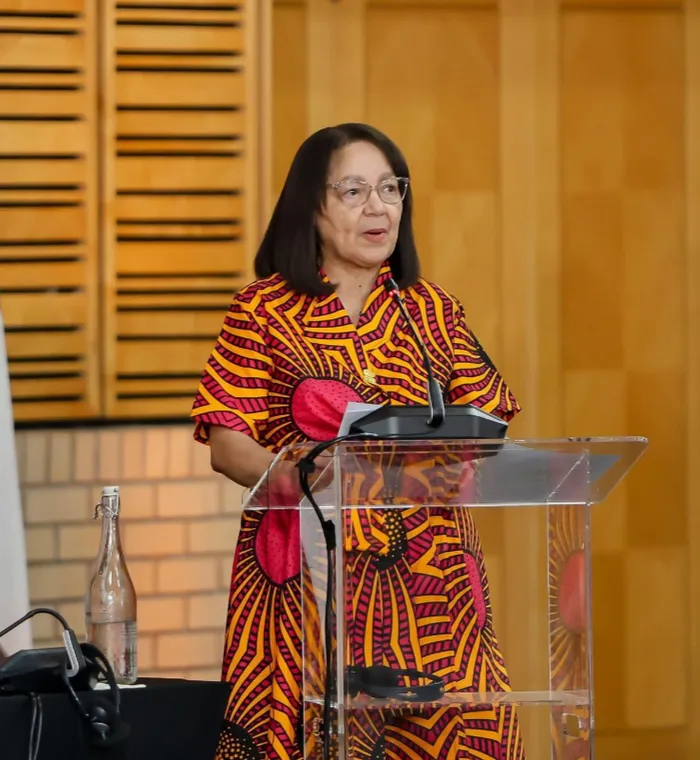G20 meeting: Priorities for sustainable tourism development unveiled

Tourism Minister Patricia de Lille delivering her speech at the opening ceremony of the G20 Tourism Ministers Meeting in Mpumalanga.
Image: Supplied
Representatives from the world's major economies assembled for the G20 Tourism Ministers Meeting at the Kruger National Park in Mpumalanga on Friday to finalise the action plan that is poised to drive sustainable tourism development among the G20 member countries.
The meeting will see ministers deliberate over the four priorities for their tourism development action plan, agreed upon in March by the G20 Tourism Working Group.
The priorities include people-centred AI and innovation for travel/tourism start-ups and SMMEs, tourism financing and investment for equality and sustainable development, and air connectivity for seamless travel and enhanced resilience for inclusive, sustainable tourism development.
Speaking at the opening ceremony ahead of the meeting, Tourism Minister Patricia de Lille said tourism creates jobs, drives economic growth, and fosters cultural connections while uplifting communities and protecting heritage.
Tourism is a significant contributor to South Africa's economy, accounting for 8.5% of the country's GDP, said the minister, adding that in July, the country welcomed over 880,000 visitors, representing a 26% year-on-year increase.
“The sector supports over 1.5 million jobs directly and indirectly, from urban hotels to rural homestays. This is not just about numbers; it’s about livelihoods, families, and futures.”
De Lille said on a global scale, tourism contributes $2 trillion in export revenues, supporting 371 million jobs and accounting for 10.3% of global GDP.
In Africa, international arrivals grew by 9% in Q1 2025, outpacing global averages.
De Lille outlined the four key priorities guiding the G20 presidency that embody a shared vision for the sector.
In terms of digital innovation, the minister said digital tools are changing travel, yet many small businesses struggle to adapt.
She said the Action Plan acknowledges that Micro, Small, and Medium Enterprises (MSMEs) are the backbone of the global tourism economy, providing employment opportunities, fostering innovation, and contributing to the attractiveness of local destinations.
She said MSMEs must undergo a digital transformation to remain competitive and future-ready.
“By improving digital literacy and supporting incubators, we can create opportunities. Digital innovation empowers small businesses, helping them compete.”
Secondly, she said tourism is a powerful engine of growth, but its benefits are not always shared equally.
“By mobilising public and private capital, reducing risks for investors, and ensuring that funds reach community-based ventures and micro-enterprises, we can create jobs, reduce inequality, and build a fairer sector.”
De Lille added that investment must also support sustainability, whether in green infrastructure, eco-lodges, or low-impact services for today’s growth not to compromise the prospects of tomorrow.
She said the Infrastructure Working Group has highlighted the importance of innovative financing models and public–private partnerships to mobilise capital for sustainable and resilient infrastructure, including connectivity.
Thirdly, in terms of air connectivity, the minister stated that regional and international air links, streamlined visa and border procedures, and cleaner aviation technologies to boost tourism, stimulate trade, and cooperation must be increased.
“G20 members, which account for 68% of all international tourist arrivals, 71% of international tourist exports, and 68% of all passenger fares, are well-positioned to play a leading role in advancing this transformation in support of global mobility, equity, and prosperity.”
Lastly, she said tourism is highly vulnerable to shocks from pandemics, climate events, and economic downturns.
“Our sector must be equipped with risk assessment tools, contingency planning, and rapid-recovery mechanisms.”
De Lille said tourism products must be diversified to safeguard jobs and protect the environment.
“A resilient tourism sector protects livelihoods and communities while adapting to the challenges of an uncertain future.”
Taken together, these four priorities are not standalone themes, she stated.
“They are interconnected pillars of a stronger global tourism system. They speak to the spirit of our G20 presidency’s guiding values: Solidarity, Equality, and Sustainability.”
De Lille highlighted tourism's role in cultural exchange and job creation, acknowledging that uncontrolled growth could harm the environment and communities.
She said sustainable practices, integrating economic growth with environmental care, are crucial for a balanced future.
“We have already begun this journey by committing to having this very event audited for sustainability, to establish a roadmap to more sustainable events in tourism, as one of the legacy initiatives of the G20.”
Related Topics: